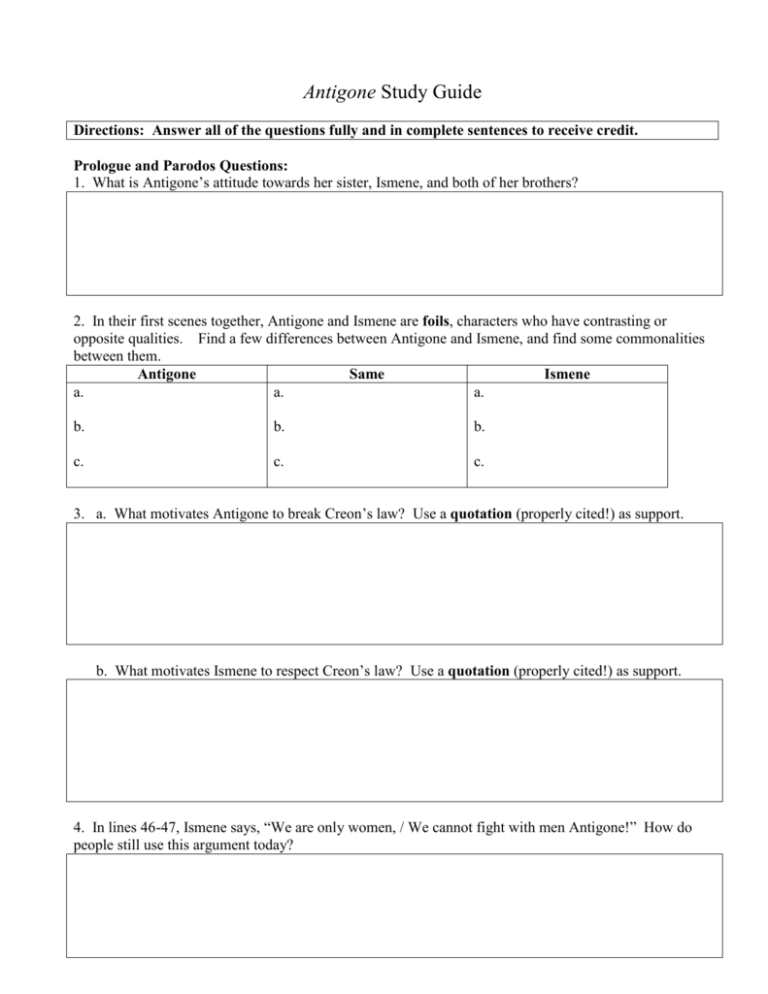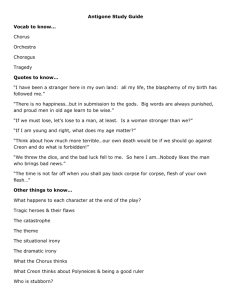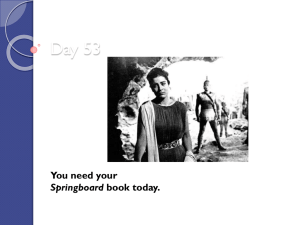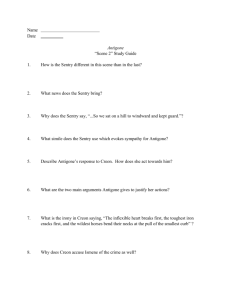Antigone
advertisement

Antigone Study Guide Directions: Answer all of the questions fully and in complete sentences to receive credit. Prologue and Parodos Questions: 1. What is Antigone’s attitude towards her sister, Ismene, and both of her brothers? 2. In their first scenes together, Antigone and Ismene are foils, characters who have contrasting or opposite qualities. Find a few differences between Antigone and Ismene, and find some commonalities between them. Antigone Same Ismene a. a. a. b. b. b. c. c. c. 3. a. What motivates Antigone to break Creon’s law? Use a quotation (properly cited!) as support. b. What motivates Ismene to respect Creon’s law? Use a quotation (properly cited!) as support. 4. In lines 46-47, Ismene says, “We are only women, / We cannot fight with men Antigone!” How do people still use this argument today? 5. Which character do you side with, Antigone or Ismene? Why? 6. Perform a close read of the Parados below. Make sure to summarize each stanza and to write your thoughts in the margins. Parados* 5 10 15 20 25 Chorus. Now the long blade of the sun, lying Level east to west, touches with glory Thebes of the Seven Gates. Open, unlidded Eye of golden day! O marching light Across the eddy and rush of Dirce’s* stream, Striking the white shields of the enemy Thrown headlong backward from the blaze of morning. Parados: a song that marks the entry of the chorus, which represents the leading citizens of Thebes Dirce’s stream: a stream flowing past Thebes. The stream is named for a murdered queen who was thrown into it. Choragus. Polyneices their commander Roused them with windy phrases, He the wild eagle screaming Insults above our land, His wings their shields of snow, His crest their marshaled helms. Chorus. Against our seven gates* in a yawning ring The famished spears came onward in the night; But before his jaws were sated with our blood Or pine fire took the garland of our towers, He was thrown back; and as he turned, great Thebes— No tender victim for his noisy power— Rose like a dragon behind him, shouting war. Seven gates: Thebes had seven gates, which the Argives Choragus. For God* hates utterly The bray of bragging tongues; And when he beheld their smiling, Their swagger of golden helms, The frown of his thunder blasted Their first man from our walls, Zeus, the king of the gods, threw a thunderbolt, which Chorus. We heard his shout of triumph high in the air Turn to a scream; far out in a flaming arc He fell with his windy torch, and the earth struck him. attacked all at once. killed the first Argive attacker. 30 And others storming in fury no less than his Found shock of death in the dusty joy of battle. Choragus. Seven captains* at seven gated Yielded their clanging arms to the god That bends the battle line and breaks it. 35 40 When the seven captains were killed, their armor was offered as a sacrifice to Ares, the god of war. These two only, brothers in blood, Face to face in matchless rage, Mirroring each the other’s death, Clashed in long combat. Chorus. But now in the beautiful morning of victory Let Thebes of the many chariots sing for joy! With hearts for dancing we’ll take leave of war: Our temples shall be sweet with hymns of praise, And the long night shall echo with our chorus. 7. Summarize the background information that the chorus gives in its song in the box below. What is the purpose or function of the song? Summary of Song Function of Song Parodos 8. What is the chorus’s opinion of Polyneices? What words and phrases in this section (cite them!) give you that impression? Scene 1 and Ode 1 Questions: 1. a. What are your first impressions of Creon? Why? b. Does he seem to be concerned with the common good, or do you think he only cares about maintaining his power? Find a quotation to back up your response (include the line number!). 2. What motive does Creon give to those who might oppose him? him? b. What does this tell you about 3. In line 113, the Choragos asks Creon, “Can it be that the gods have done this?” What does this suggestion imply? 4. What dramatic irony is there when Creon refers to Polyneices’s burial? 5. On the basis of Scene 1, how would you characterize Creon’s strengths as a leader? Why? Use evidence that is properly cited to support your response. b. What are Creon’s weaknesses? Why? Use evidence that is properly cited to support your response. 6. What do you predict will happen when Creon discovers the truth about the burial of Polyneices? What will he do, and how will Antigone react? 7. Perform a close read of Ode 1 below. Make sure to summarize each stanza and to write your thoughts in the margins. 5 10 15 Chorus Numberless are the world’s wonders, but none More wonderful than man; the storm-gray sea Yields to his prows, the huge crests bear him high; Earth, holy and inexhaustible, is graven With shining furrows where his plows have gone Year after year, the timeless labor of stallions. The light-boned birds and beasts that cling to cover, The lithe fish lighting their reaches of dim water, All are taken, tamed in the net of his mind; The lion on the hill, the wild horse windy-maned, Resign to him; and his blunt yoke has broken The sultry shoulders of the mountain bull. Words also, and thought as rapid as air, He fashions to his good use; statecraft is his And his the skill that deflects the arrows of snow, The spears of winter rain: from every wind He has made himself secure – from all but one: In the late wind of death he cannot stand. 8. Summarize the background information that the chorus gives in its song in the box below. What is the purpose or function of the song? How does the song relate to Scene 1? Summary of Song Function of Song Relation of Song to Scene 1 Ode 1 Scene 2 and Ode 2 Questions: 1. What do you think is the greatest force motivating Antigone at this point—pride, love, or principle? Give a quotation (with line number!) to support your response. 2. How do you feel about Creon after this scene? What are his motivations? 3. Why do you think Ismene changes her mind about her brother’s burial? b. Why do you think Antigone doesn’t want Ismene’s support? Do you think she should accept her support? Why? 4. Perform a close read of Ode 2 below. Make sure to summarize each stanza and to write your thoughts in the margins. Chorus Fortunate is the man who has never tasted God’s vengeance! Where once the anger of heaven has struck, that house is shaken Forever: damnation rises behind each child Like a wave cresting out of the black northeast, 5 When the long darkness under sea roars up And bursts drumming death upon the wind-whipped sand I have seen this gathering sorrow from time long past Loom upon Oedipus’ children: generation from generation Takes the compulsive rage of the enemy god. 10 15 20 So lately this last flower of Oedipus’ line Drank the sunlight! But now a passionate word And a handful of dust have closed up all its beauty. What mortal arrogance Transcends the wrath of Zeus? Sleep cannot lull him nor the effortless long months Of the timeless gods: but he is young forever, And his house is the shining day of high Olympus. All that is and shall be, And all the past, is his. No pride on earth is free of the curse of heaven. The straying dreams of men May bring them ghosts of joy: But as they drowse, the waking embers burn them; Or they walk with fixed eyes, as blind men walk. But the ancient wisdom speaks for our own time: Fate works most for woe With Folly’s fairest show. Man’s little pleasure is the spring of sorrow. 5. Summarize the background information that the chorus gives in its song in the box below. What is the purpose or function of the song? How does the song relate to Scene 2? Summary of Song Function of Song Relation of Song to Scene 2 Ode 2 Scene 3 and Ode 3 Questions: 1. In this scene, Creon withstands a powerful assault on his thinking. Who makes the attack, and how does it affect Creon? How do you think it may continue to affect him? 2. In line 29, Creon says that Antigone will plead “family ties” to get out of being punished. Do you think Antigone will do this? Why or why not? 3. What metaphors does Haimon use to argue that Creon should be more flexible? Cite and explain them. b. In lines 76-79 of Scene 2, Creon uses a similar argument against Antigone. What is it? c. At this point in the play, do you think Antigone or Creon should be more yielding? Why? d. Are there some principles that you think you should never give up? Which ones? 4. “The State is the king!” declares Creon in line 107. “Yes,” replies Haimon, “if the State is a desert.” What does this mean? 5. Perform a close read of Ode 3 below. Make sure to summarize each stanza and to write your thoughts in the margins. Chorus Love, unconquerable Waster of rich men, keeper Of warm nights and all-night vigil In the soft face of a girl: 5 Sea-wanderer, forest-visitor! Even the pure Immortals cannot escape you, And mortal man, in his one day's dusk, Trembles before your glory. 10 15 Surely you swerve upon ruin The just man's consenting heart, As here you have made bright anger Strike between father and son--And none has conquered but Love! A girl's glance working the will of heaven: Pleasure to her alone who mocks us, Merciless Aphrodite.* *Aphrodite: the goddess of love and beauty 6. Summarize the background information that the chorus gives in its song in the box below. What is the purpose or function of the song? How does the song relate to Scene 3? Summary of Song Function of Song Relation of Song to Scene 3 Ode 3 Scene 4 and Ode 4 Questions: 1. How is Antigone’s tone in this scene different from her tone in earlier scenes? Use evidence that is properly cited as support. b. Why do you think Antigone’s tone is different? Do you think the change results from circumstance or from a change in her character? 2. Do you agree with the Chorus’s opinion (in lines 47-48) that Antigone is responsible for her own death? Explain your response. 3. How do you feel about Antigone’s last lines of the scene? What does she ask? Does this request seem out of character for Antigone? Explain. b. What do you predict will happen to Creon in the final scene? 4. Perform a close read of Ode 4 below. Make sure to summarize each stanza and to write your thoughts in the margins. Chorus All Danae’s* beauty was locked away In a brazen cell where the sunlight could not come: A small room, still as any grave, enclosed her. Yet she was a princess too, 5 And Zeus in a rain of gold poured love upon her. O child, child, No power in wealth or war Or tough sea blackened ships Can prevail against untiring Destiny! 10 15 20 25 30 And Dryas’ son also, that furious king, Bore the god’s prisoning anger for his pride: Sealed up by Dionysos in deaf stone, His madness died among echoes. So at the last he learned what dreadful power His tongue had mocked: For he had profaned the revels, And fired the wrath of the nine Implacable sisters that love the sound of the flute. And old men tell a half remembered tale Of horror done where a dark ledge splits the sea And a double surf beats on the grey shores: How a king’s new woman, sick With hatred for the queen he had imprisoned, Ripped out his two sons’ eyes with her bloody hands While grinning Ares watched the shuttle plunge Four times: four blind wounds crying for revenge, Crying, tears and blood mingled. Piteously born, Those sons whose mother was of heavenly birth! Her father was the god of the North Wind And she was cradled by gales, She raced with young colts on the glittering hills And walked untrammeled in the open light: But in her marriage deathless Fate found means To build a tomb like yours for all her joy. The princess Danae was imprisoned by her father because it had been predicted that her son would one day kill him. After Zeus visited Danae in the form of a shower of gold, she gave birth to Perseus, who did eventually kill his grandfather. King Lycurgus, son of Dryas, was driven mad and eaten by horses for objecting to the worship of Dionysus. The nine implacable sisters are the Muses, who presided over literature, the arts, and the sciences. Once offended, they were impossible to appease. These lines refer to the myth of King Phineus, who imprisoned his first wife, the daughter of the north wind, and allowed his second wife to blind his sons from his first marriage. 5. Summarize the background information that the chorus gives in its song in the box below. What is the purpose or function of the song? How does the song relate to Scene 4? Summary of Song Function of Song Relation of Song to Scene 4 Ode 4 Scene 5, Paean, and Exodos Questions: 1. Why is it ironic that the prophet Teiresias is blind? What kind of irony is this? 2. Why do you think Creon finally agrees to free Antigone and bury Polyneices? What do you think his motives are? Use evidence that is properly cited to support your response. 3. What do you think the theme of the play is? Why? Use evidence that is properly cited to support your response. 4. At the end of this tragedy, Eurydice blames Creon for the disastrous turn of events. Creon accepts this, saying, “I alone am guilty” (line 121). What do you think of Creon’s statement of sole responsibility? Do you think that he alone is guilty for the events that transpired? Explain. 5. Summarize the background information that the chorus gives in its song in the box below. What is the purpose or function of the song? How does the song relate to Scene 5? Summary of Song Function of Song Relation of Song to Scene 5 Paean 6. Antigone is considered a Greek tragedy, and, as such, it recounts the downfall of a dignified, superior character—a tragic hero. Tragic heroes have a tragic flaw—an error or weakness that contributes to his/her downfall. Based on this definition, argue who the true tragic hero of Antigone is. Properly cite two pieces of evidence from the play to support your argument. 7. Did the characters benefit from doing what they believed? Did they get what they deserved? Explain.




